18+ Business Objectives Examples to Download
Starting and growing a business requires more than just an idea and the resources to make it a reality. It requires a clear set of objectives that are aligned with a solid business plan, development strategy, and execution plan. Whether you’re just starting out or you’re looking to take your business to the next level, establishing clear and measurable business objectives is essential to achieving success. In this article, we’ll take a closer look at what business objectives are, how to create them, and some common questions and answers about this important aspect of business planning.
1. Business Objectives and Context

aalto.fi
2. Competitive Business Objectives

rewardinglearning.org.uk
3. Corporate Volunteering Business Objectives

iave.org
4. Project Management to Business Objectives
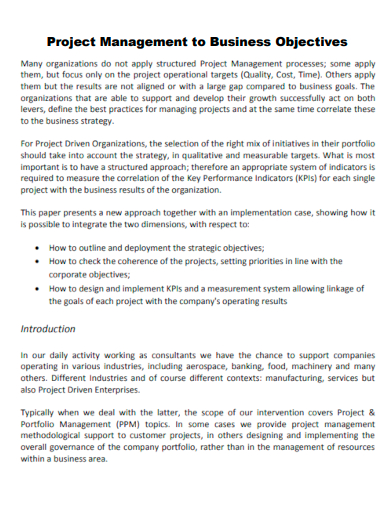
tamu.edu
5. Business Objectives of Telecommunications Policy
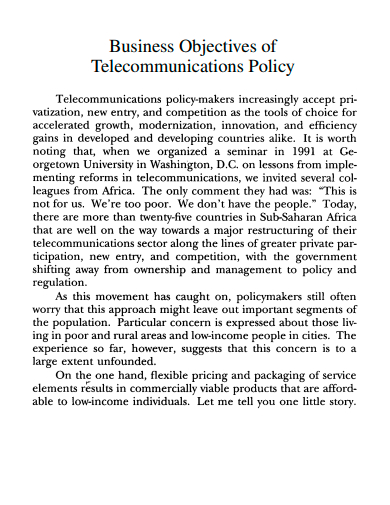
fordham.edu
6. Objectives of a Business Firm
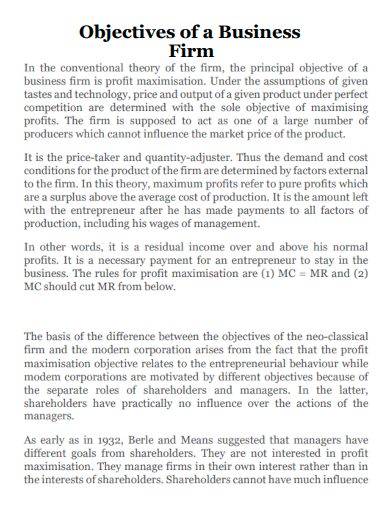
misskeith.com
7. Setting Goals to Meet Business Objectives
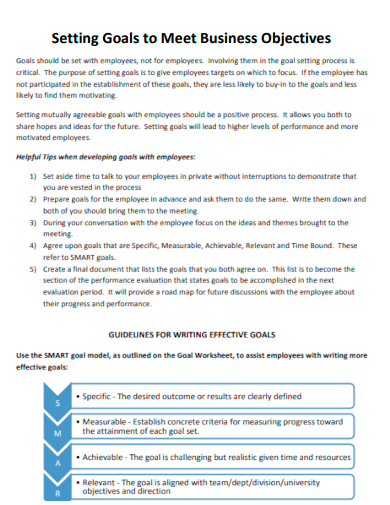
slu.edu
8. Fitness Business Objectives
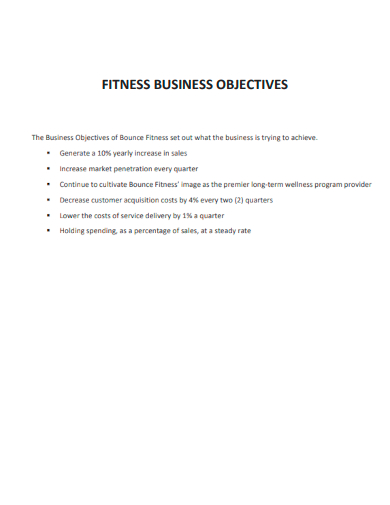
precisiongroup.com.au
9. Essay on Objectives of Business
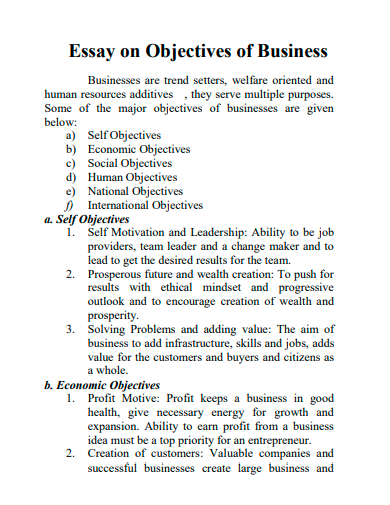
ijemr.com
10. Business Objectives & Strategies

cbr.cam.ac.uk
11. Business Objective Quiz

mrmurphys.com
12. Business Through Goals and Objectives
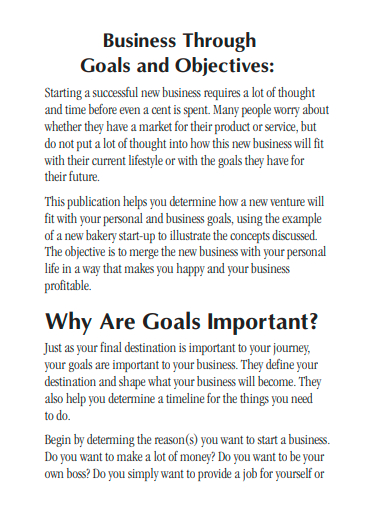
purdue.edu
13. Aligning IT With Business Objectives
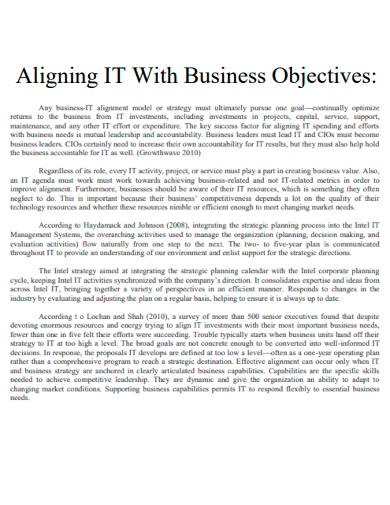
clutejournals.com
14. Objectives and Outcomes of Business Innovation

oecd-ilibrary.org
15. Business Objectives With Collaborative Work
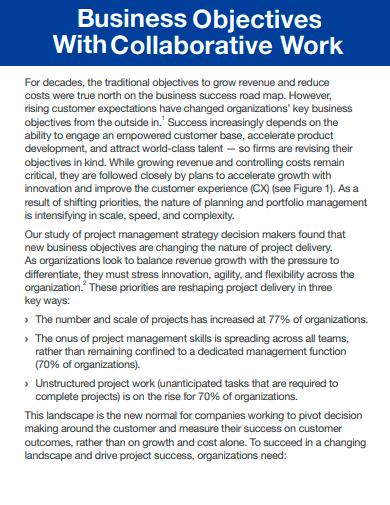
sei.cmu.edu
16. Business Environment and its Objectives
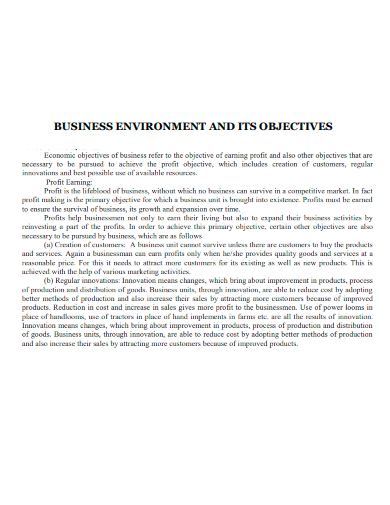
eprajournals.com
17. Objectives of Bachelor of Business
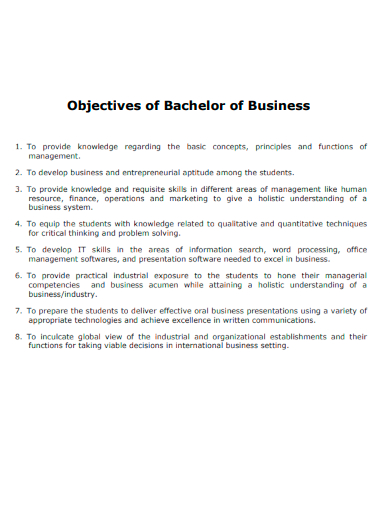
dei.ac
18. Advocacy and Other Business Objectives
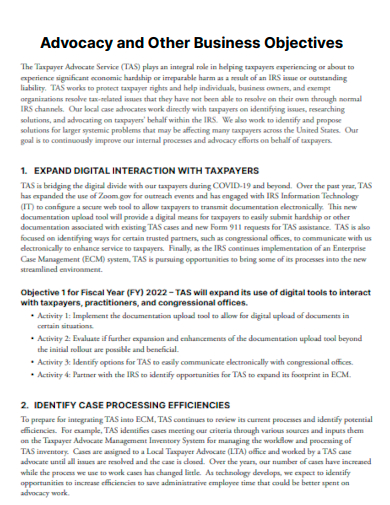
irs.gov
19. Business Writing Learning Objectives

amanet.org
What is a Business Objective?
Business objectives are specific, measurable, and time-bound goals that a business sets for itself to achieve as part of its overall strategy. These objectives are designed to help the business reach its full potential, increase profitability, and improve overall performance. A business objective should be aligned with the company’s mission statement, vision, and core values, and should be part of a larger plan, such as a five-year business plan or a one-pager.
How to create Business Objectives
Creating a business objective involves several steps. Here’s a general guide on how to create a business objective:
Step 1: Start with a personal mission statement
Define your personal values, goals, and aspirations, and how they align with your business goals.
Step 2: Create a vision board
Visualize what you want your business to achieve and how it will impact your life and the lives of others.
Step 3: Develop a business development strategy
Identify the key areas of focus for your business, such as customer acquisition, product development, or marketing. This will allow you to develop an effective and efficient business development strategy.
Step 4: Create a strategy execution plan
Outline the steps you need to take to achieve your business objectives, including timelines, budgets, and resources to create a strategy execution plan.
Step 5: Set specific, measurable, and time-bound business objectives
Define your goals in terms of what you want to achieve, how you will measure success, and when you want to achieve it.
FAQs
Why are business objectives important?
Business objectives provide a clear direction for your business and help you stay focused on what’s important. They also help you measure progress and make informed decisions about where to allocate resources.
How do I know if my business objectives are achievable?
Your business objectives should be challenging but realistic. They should be based on a thorough analysis of your business’s strengths, weaknesses, opportunities, and threats, and should take into account any external factors that may impact your business.
Can I change my business objectives if I need to?
Yes, business objectives should be flexible and adaptable to changing market conditions, customer needs, and internal factors such as budget or resource constraints.
How often should I review and update my business objectives?
Business objectives should be reviewed on a regular basis, such as quarterly or annually, to ensure they remain relevant and aligned with your overall business strategy.
In conclusion, setting clear and measurable business objectives is a critical component of successful business planning. By following a step-by-step process and aligning your objectives with your personal mission statement, vision board, and business development strategy, you can create a roadmap for success and achieve your business goals. Remember to review and adjust your objectives as needed to ensure they remain relevant and aligned with your overall business strategy.
18+ Business Objectives Examples to Download

Starting and growing a business requires more than just an idea and the resources to make it a reality. It requires a clear set of objectives that are aligned with a solid business plan, development strategy, and execution plan. Whether you’re just starting out or you’re looking to take your business to the next level, establishing clear and measurable business objectives is essential to achieving success. In this article, we’ll take a closer look at what business objectives are, how to create them, and some common questions and answers about this important aspect of business planning.
1. Business Objectives and Context

aalto.fi
Details
File Format
PDF
Size: 859 KB
2. Competitive Business Objectives

rewardinglearning.org.uk
Details
File Format
PDF
Size: 138 KB
3. Corporate Volunteering Business Objectives

iave.org
Details
File Format
PDF
Size: 670 KB
4. Project Management to Business Objectives

tamu.edu
Details
File Format
PDF
Size: 1 MB
5. Business Objectives of Telecommunications Policy

fordham.edu
Details
File Format
PDF
Size: 274 KB
6. Objectives of a Business Firm

misskeith.com
Details
File Format
PDF
Size: 188 KB
7. Setting Goals to Meet Business Objectives

slu.edu
Details
File Format
PDF
Size: 75 KB
8. Fitness Business Objectives

precisiongroup.com.au
Details
File Format
PDF
Size: 94 KB
9. Essay on Objectives of Business

ijemr.com
Details
File Format
PDF
Size: 303 KB
10. Business Objectives & Strategies

cbr.cam.ac.uk
Details
File Format
PDF
Size: 239 KB
11. Business Objective Quiz

mrmurphys.com
Details
File Format
PDF
Size: 3 MB
12. Business Through Goals and Objectives

purdue.edu
Details
File Format
PDF
Size: 347 KB
13. Aligning IT With Business Objectives

clutejournals.com
Details
File Format
PDF
Size: 302 KB
14. Objectives and Outcomes of Business Innovation

oecd-ilibrary.org
Details
File Format
PDF
Size: 19 KB
15. Business Objectives With Collaborative Work

sei.cmu.edu
Details
File Format
PDF
Size: 630 KB
16. Business Environment and its Objectives

eprajournals.com
Details
File Format
PDF
Size: 314 KB
17. Objectives of Bachelor of Business

dei.ac
Details
File Format
PDF
Size: 551 KB
18. Advocacy and Other Business Objectives

irs.gov
Details
File Format
PDF
Size: 74 KB
19. Business Writing Learning Objectives

amanet.org
Details
File Format
PDF
Size: 8 KB
What is a Business Objective?
Business objectives are specific, measurable, and time-bound goals that a business sets for itself to achieve as part of its overall strategy. These objectives are designed to help the business reach its full potential, increase profitability, and improve overall performance. A business objective should be aligned with the company’s mission statement, vision, and core values, and should be part of a larger plan, such as a five-year business plan or a one-pager.
How to create Business Objectives
Creating a business objective involves several steps. Here’s a general guide on how to create a business objective:
Step 1: Start with a personal mission statement
Define your personal values, goals, and aspirations, and how they align with your business goals.
Step 2: Create a vision board
Visualize what you want your business to achieve and how it will impact your life and the lives of others.
Step 3: Develop a business development strategy
Identify the key areas of focus for your business, such as customer acquisition, product development, or marketing. This will allow you to develop an effective and efficient business development strategy.
Step 4: Create a strategy execution plan
Outline the steps you need to take to achieve your business objectives, including timelines, budgets, and resources to create a strategy execution plan.
Step 5: Set specific, measurable, and time-bound business objectives
Define your goals in terms of what you want to achieve, how you will measure success, and when you want to achieve it.
FAQs
Why are business objectives important?
Business objectives provide a clear direction for your business and help you stay focused on what’s important. They also help you measure progress and make informed decisions about where to allocate resources.
How do I know if my business objectives are achievable?
Your business objectives should be challenging but realistic. They should be based on a thorough analysis of your business’s strengths, weaknesses, opportunities, and threats, and should take into account any external factors that may impact your business.
Can I change my business objectives if I need to?
Yes, business objectives should be flexible and adaptable to changing market conditions, customer needs, and internal factors such as budget or resource constraints.
How often should I review and update my business objectives?
Business objectives should be reviewed on a regular basis, such as quarterly or annually, to ensure they remain relevant and aligned with your overall business strategy.
In conclusion, setting clear and measurable business objectives is a critical component of successful business planning. By following a step-by-step process and aligning your objectives with your personal mission statement, vision board, and business development strategy, you can create a roadmap for success and achieve your business goals. Remember to review and adjust your objectives as needed to ensure they remain relevant and aligned with your overall business strategy.

